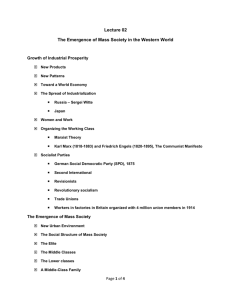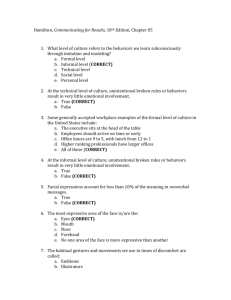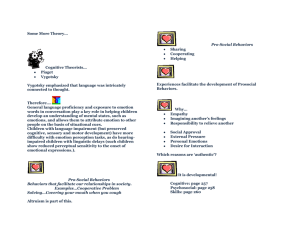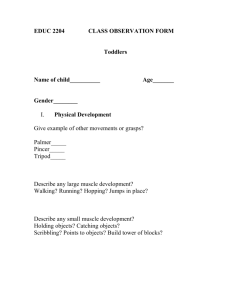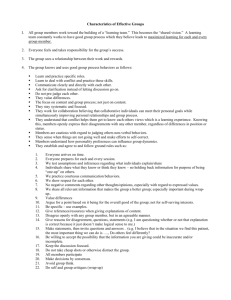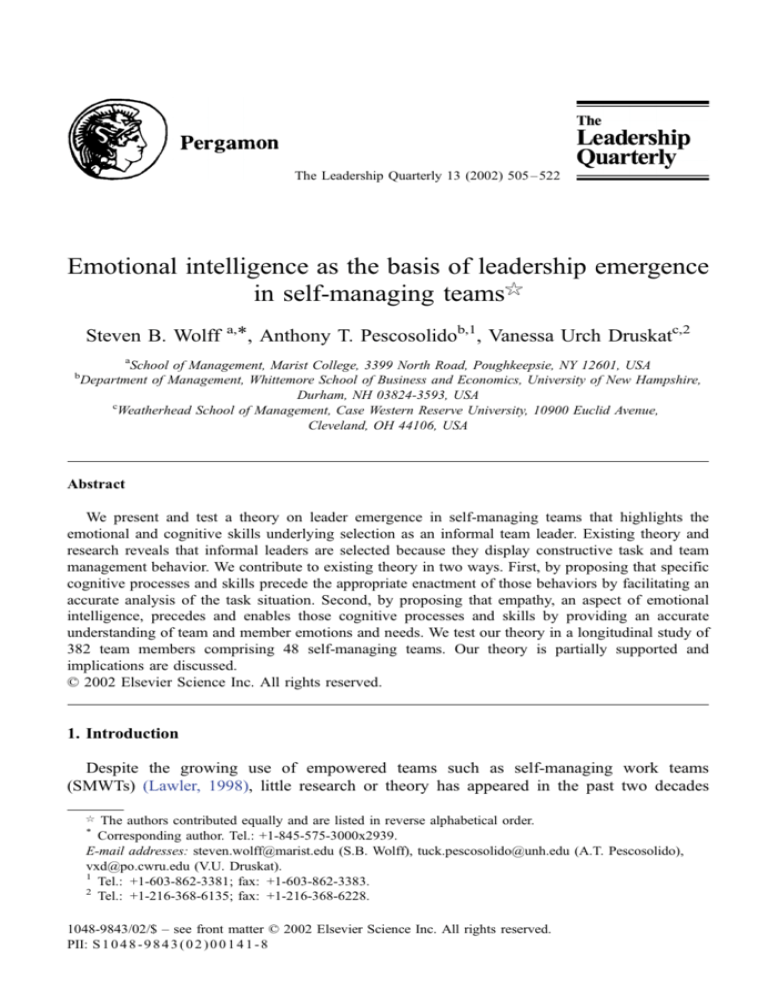
The Leadership Quarterly 13 (2002) 505 – 522
Emotional intelligence as the basis of leadership emergence
in self-managing teams$
Steven B. Wolff a,*, Anthony T. Pescosolidob,1, Vanessa Urch Druskatc,2
a
b
School of Management, Marist College, 3399 North Road, Poughkeepsie, NY 12601, USA
Department of Management, Whittemore School of Business and Economics, University of New Hampshire,
Durham, NH 03824-3593, USA
c
Weatherhead School of Management, Case Western Reserve University, 10900 Euclid Avenue,
Cleveland, OH 44106, USA
Abstract
We present and test a theory on leader emergence in self-managing teams that highlights the
emotional and cognitive skills underlying selection as an informal team leader. Existing theory and
research reveals that informal leaders are selected because they display constructive task and team
management behavior. We contribute to existing theory in two ways. First, by proposing that specific
cognitive processes and skills precede the appropriate enactment of those behaviors by facilitating an
accurate analysis of the task situation. Second, by proposing that empathy, an aspect of emotional
intelligence, precedes and enables those cognitive processes and skills by providing an accurate
understanding of team and member emotions and needs. We test our theory in a longitudinal study of
382 team members comprising 48 self-managing teams. Our theory is partially supported and
implications are discussed.
D 2002 Elsevier Science Inc. All rights reserved.
1. Introduction
Despite the growing use of empowered teams such as self-managing work teams
(SMWTs) (Lawler, 1998), little research or theory has appeared in the past two decades
$
The authors contributed equally and are listed in reverse alphabetical order.
Corresponding author. Tel.: +1-845-575-3000x2939.
E-mail addresses: steven.wolff@marist.edu (S.B. Wolff), tuck.pescosolido@unh.edu (A.T. Pescosolido),
vxd@po.cwru.edu (V.U. Druskat).
1
Tel.: +1-603-862-3381; fax: +1-603-862-3383.
2
Tel.: +1-216-368-6135; fax: +1-216-368-6228.
*
1048-9843/02/$ – see front matter D 2002 Elsevier Science Inc. All rights reserved.
PII: S 1 0 4 8 - 9 8 4 3 ( 0 2 ) 0 0 1 4 1 - 8
506
S.B. Wolff et al. / The Leadership Quarterly 13 (2002) 505–522
to help answer persistent questions about their leadership needs (Cohen, Chang, & Ledford,
1997; Druskat & Wheeler, in press). One subject that has received some research attention
is leadership emergence in SMWTs, and in particular, assessment of the behaviors that
predict one’s emergence as an informal team leader (Smith & Foti, 1998; Taggar, Hackett,
& Saha, 1999). Emergent team leaders hold no formal authority and team willingness to
follow their lead can end at any time. Thus, theory and research attempting to isolate why
certain individuals are selected for the role lends insight into perceived leadership needs in
SMWTs.
Existing research reveals that the behaviors predicting one’s emergence as an informal
leader can be organized into two categories—task- and member-focused behavior—and that
task-focused behaviors (e.g., task coordination) are the strongest predictors (see Bales, 1950;
Lord, 1977; Taggar et al., 1999). To date, however, little research or theory has sought to
identify the knowledge, skills, and abilities (KSAs) that underlie and enable the behaviors that
predict emergence.
In this article, we introduce and test a model of the KSAs that predict leadership
emergence in SMWTs. Our model underscores the relevance of emotional and cognitive
skills to the exhibition of the behaviors that predict leader emergence. It combines three
propositions drawn from previous leadership theory that serve as the basis of the model:
(1) that emergent leaders are socially perceptive and skilled at recognizing and understanding the feelings and emotions in their team (see Chowdhry & Newcomb, 1952;
Steiner, 1972), (2) that this understanding augments a leader’s cognitive analysis and
prioritization of issues facing the team (see Salovey, Bedell, Detweiler, & Mayer, 2000;
Zajonc, 1998), and (3) that the high quality cognitive analysis underlies and leads to the
skilled behavior (see Bandura, 1982) that predicts leader emergence. We combine these
propositions to introduce and test a model suggesting the specific KSAs necessary for
attaining informal leadership status in a self-managing team. For the purposes of our study,
informal leadership status was assessed by the percentage of teammate votes each member
received for ‘‘informal leader.’’
We begin with our literature review and the presentation of our study hypotheses, which
are presented from back to front. That is, we start by describing the skilled behaviors we
propose to be most directly related to emergence as an informal team leader. We then present
the cognitive skills that support those behaviors. Lastly, we present the emotional skill that we
propose to be the basis of leadership emergence.
2. Leadership emergence in self-managing teams
The model and hypotheses we discuss in this section are presented in Fig. 1.
2.1. Behaviors predicting leader emergence
Leadership resides in the situation; every situation has specialized demands that call for
certain leadership behaviors (Kozlowski, Gully, Salas, & Cannon-Bowers, 1996; Stogdill,

